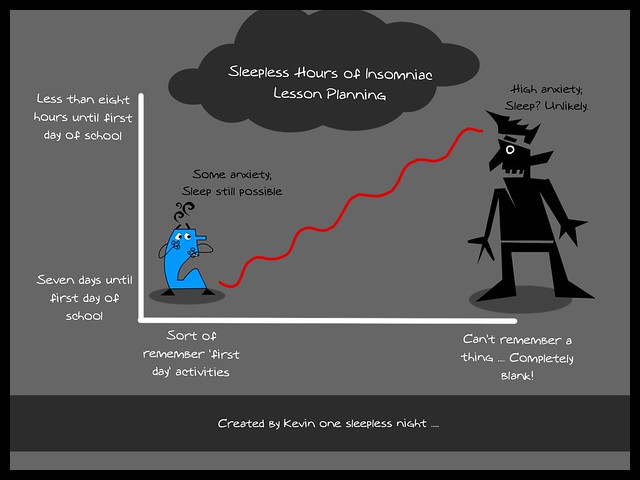This is our family holiday tradition:
Peace (whatever your faith and beliefs),
Kevin
Category Archives: Homepage
Infographic: Screen Time

Hmm. I like this graphic in that it forces us to consider the consumer vs. creator concept when we put technology and digital media into the hands of our kids. This ran in the Boston Globe recently. While I like the visual, I am not sure I like the title on it so much. I don’t see it as a defense of screen time so much as the possibilities of digital media creation.
Peace (in the sectors),
Kevin
Oh, The Irony of It
If you have some time, watch this video about language immersion. It’s well-done, if bent to a certain political view.
This “Immersion” video is a required part of a state-sponsored Sheltered English Immersion course that I am taking part in right now. All teachers will eventually need to get a certification around teaching students whose primary language is not English. This course will fulfill my requirement, but I have to say that, even with the boatload of work, it is valuable information and discussions for all of my students.
Back to the video … we are required to watch it and then write about it in our online community space.
I find it very ironic that the very same state Department of \Education that is ramping up state testing into the PARCC while ramming data of student growth models down our throats for how it will judge how we are doing — as schools, as educators (the state wants student test scores as part of our evaluation/accountability process) — wants us educators to watch this video in which the systematic push towards standardized testing — and no accommodations for students learning English — hurts and hinders a child who wants to do well.
I mean, that is the message of this video, loud and clear. What am I to make of that tension between the video and the reality of our state’s educational system? (Note: we banned bilingual educational services a few years ago after some California right-wing moneybag came into our state and funded/pushed a referendum on us. Then, he left us with the mess to figure out. Later, the Department of Justice stepped in, which is where the push for Sheltered Immersion is coming from)
Do the state folks feel for the young child in this short movie? If so, why do we have the same restrictions here in our schools that are featured there in that video?
I suspect there is tension in any administrative system, so then I wondered: Is the sharing of this video some subversive act by a technocrat in the state Department of Education?
I’m down with that.
Peace (in the vid),
Kevin
In Knowledge Quest: Educator Advocacy
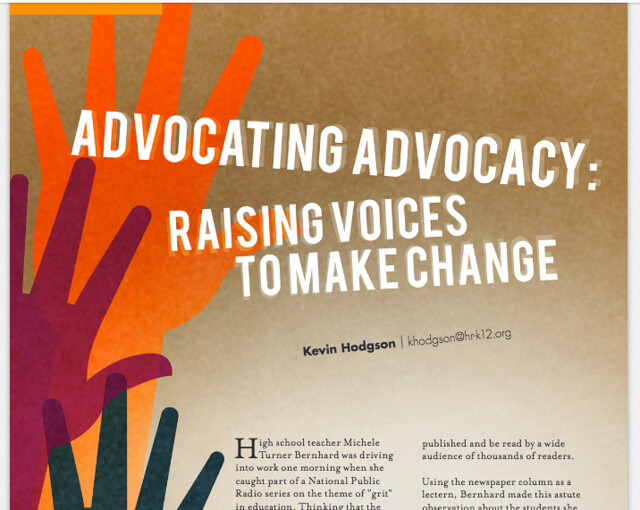
I had the pleasure of being asked by Melissa Techman, a guest-co-editor of the September/October 2014 edition of the Knowledge Quest journal, to write a piece about educator advocacy. My aim was to share some of the work that our Western Massachusetts Writing Project has done with regional teachers around getting published in local newspapers and to showcase practical advice on how to hone a message that is both positive and focused on supporting teachers in the classroom.

My piece — Advocating Advocacy: Raising Voices to Make Change — did not make it into the paper version of the Knowledge Quest magazine (darn, and we get it at home, too, as my wife is an administrator and a librarian) but the piece is available as an online exclusive for viewing and sharing. I owe a debt to my networking friends Steve Zemelman and Menoo Rami, who answered some of my questions about work they do to support educators in finding their voice through writing. And I need to give a a shout-out to a local teacher, Michele Turner Bernhard, for allowing me to use her story as a teacher-writer as my lead-in to the piece.
You can find the article through the American Library Association website or just go here to the article itself, as pdf file. And it is always worth checking out Steve’s Teachers Speak Up website for what he has been up to. And for inspiration, read Menoo’s book, Thrive.
Peace (in the raising of the voice),
Kevin
App Review: Hyperlapse

It’s no secret that I am not a big fan of Facebook and Instragram, mostly due to Zuckerberg and company’s shifting feet on privacy issues. But a new video creation app put out last week under the Instagram umbrella (but it is its own app) called Hyperlapse is pretty nifty. (and it does not seem to have any place for privacy invasions, other than what you might film as video).
The free app allows you to easily shoot a scene that then gets converted into a timelapse video. The controls are simple to use and you have a few options when you are done around speeding it up or slowing it down, and then saving it to your device or sharing it to, eh, Instragram or Facebook. Projects don’t save in the app, as far as I can tell, so when you are done, you are done. It sort of feels like a neat cousin to Vine (but don’t tell Twitter I said that).
(don’t blink … it’s over before you know it)
I’m still thinking about how to use Hyperlapse more, but here, I composed a shot of a ceiling fan, from below, and I think it looks pretty artistic. I’m wondering if I can get a shot of my son playing baseball …
Peace (in the app),
Kevin
Nonsense Graph: Night Before Students Return
Watch Rita F. Pierson and Get Inspired to Teach
Time to Unplug for August (my blog vacation)
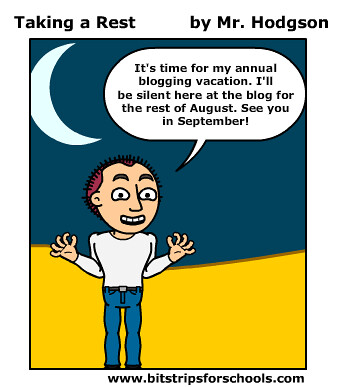
It’s that time of year when I need to pull back from blogging and some other virtual writing, so this space will be nice and quiet for the rest of August. Along with some much-anticipated family vacation time, I will be doing some prep work for professional development I am facilitating and finally getting a chance to think about my keynote for the K12 Online Conference. Basically, it’s a breather.
See you in a few weeks!
Peace (in the silence),
Kevin
In the News: Me, the teacher/writer
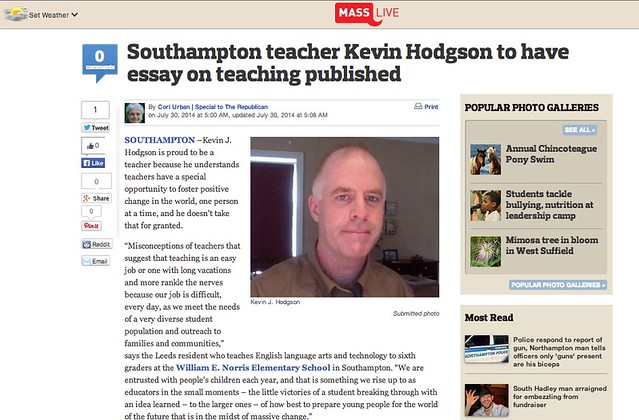
The regional newspaper (for which I once worked as a journalist in my life before teaching) did a feature story on my role as a contributing writer for the collection, Teaching with Heart. I tried to raise the role of teacher advocacy in the interview, as best as I could, and I hope the message may resonate. The collection, by the way, is fantastic, with short essays by dozens of educators writing about poems that are important to them.
Read the article and check out the book (be sure to use the discount code at the bottom of the article)
Peace (on the page),
Kevin
Children of the Screen: Reading Offline vs Online
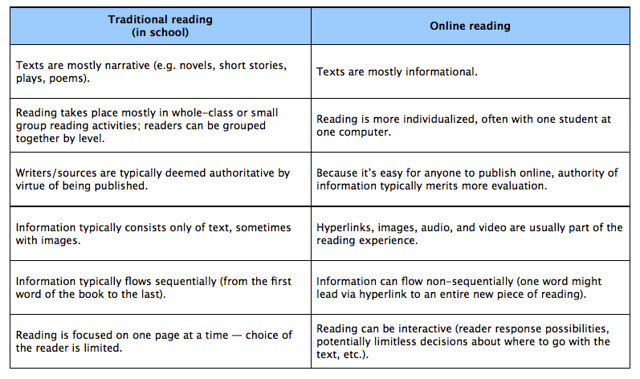
A conversation with some friends had me sharing out an old piece I had written about online reading comprehension. Much of what I learned about how kids read with screens comes from the folks at the New Literacies Institute (some of whom are still in my orbit — Ian and Greg). In that article, I had created this chart with help of other folks through some crowdsourcing, and mostly, the chart still holds up.
You can read the piece over at the Learn NC site.
I’d also be remiss not to share out a few of my webcomics that I had done around this theme of “children of the screen” when I was writing Boolean Squared. (It’s a bit dated, as you can tell from the reference to Apple still developing an ereader, which became the iPad. Was it really that long ago that I was writing this BS?)



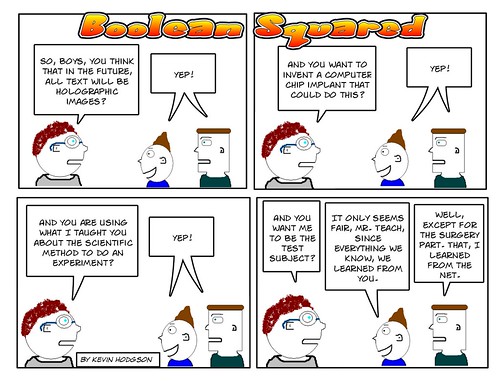
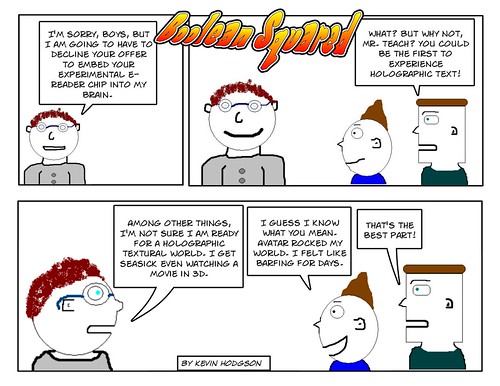
Peace (on the screen),
Kevin
